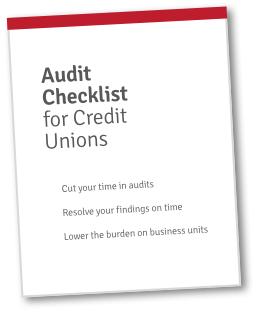Credit union regulatory exams don’t come around often, but they are stressful. These exams tips will give you more confidence and better results.
Special thanks to CUNA for some of these tips. Other thanks goes to the National Federation of Community Development Credit Unions for this deck. It may be a little outdated, but there are still many great tips for credit unions of any size.
1. Review the NCUA's Regulatory Priorities
This is the first and most important thing you should do before your credit union’s regulatory exam. There may be lingering changes due to the effect of COVID-19 and on-site examinations. Additionally, this is where you’ll find the NCUA’s largest areas of regulatory concern, such as Interest Rate Risk, Credit Risk, and CECL implementation.
You can always get our recap of the NCUA Supervisory Priorities here.
2. Remember That the NCUA Is on Your Side
One particularly insightful section of the deck is titled, Things That Make Your Examiner Smile. It explains some specific actions you can take to impress your examiner—and make your life easier.
Here are a couple highlights:
- Maintain a track record of doing cash counts on your tellers (if applicable);
- Keep a locked area for your IT equipment (this is mandatory); and
- Take minutes that actually tell the examiner what is going on with your credit union.
Those minutes are important! They prove to the NCUA that you’re discussing critical topics. They won’t have to just take your word for it.
3. The NCUA Isn’t Mean
The NCUA examiners aren’t mean, either. It’s always helpful to remember that the examiners who cause us stress are only human. They’re doing their jobs. Incidentally, their jobs are geared toward the ongoing success of our credit unions.
Two salient points:
- NCUA is the regulator (for many) and the insurer. They will always want to be on the side of less risk. That is what insurers do.
- You can disagree!
Remember that showing your risk mitigation process is the goal. Risk itself isn’t bad, but it must be a calculated risk. You must demonstrate that you’re not jeopardizing your portfolio, membership, or operations.
Pre-Exam and Mid-Exam Tips
We’ve written about how to prepare for an examination, but more perspective always helps. For example, both CUNA and the deck suggest that credit unions should have a say in when their examination begins. They should also remember to keep their board and supervisory committee in the loop!
Mid-exam, they also remind credit union CEOs to keep up with the daily to-dos:
- Check in with your examiner each day. Ask them if they need any additional information. Ask them for any findings. Communicate!
- Make sure the examiner is specific about their findings or requests. If it’s a violation of a regulation, ask them which one. They should be able to cite it.
- If their findings are nit-picky, then smile. You have done well.
To that last point, dealing with small, seemingly insignificant findings, is actually a good sign. If the worst thing they found is barely worth mentioning, then it means they couldn’t find anything egregious. Well done!
Additional Resources
Did you know that many credit unions struggle to resolve findings in a timely manner? It's true. Everyone involved recognizes that addressing audit findings is a necessity. But business units have their hands full with important strategic priorities, and resolving audit findings often drops to the bottom of the priority list.
But it doesn't have to be that way...
With the right tools and techniques, findings can be consistently resolved on time and as expected — without being a burden on business units.
Use the Unresolved Findings Eliminator to take control of your findings process.



 Get FREE Access to the Audit Checklist for Credit Unions!
Get FREE Access to the Audit Checklist for Credit Unions!


